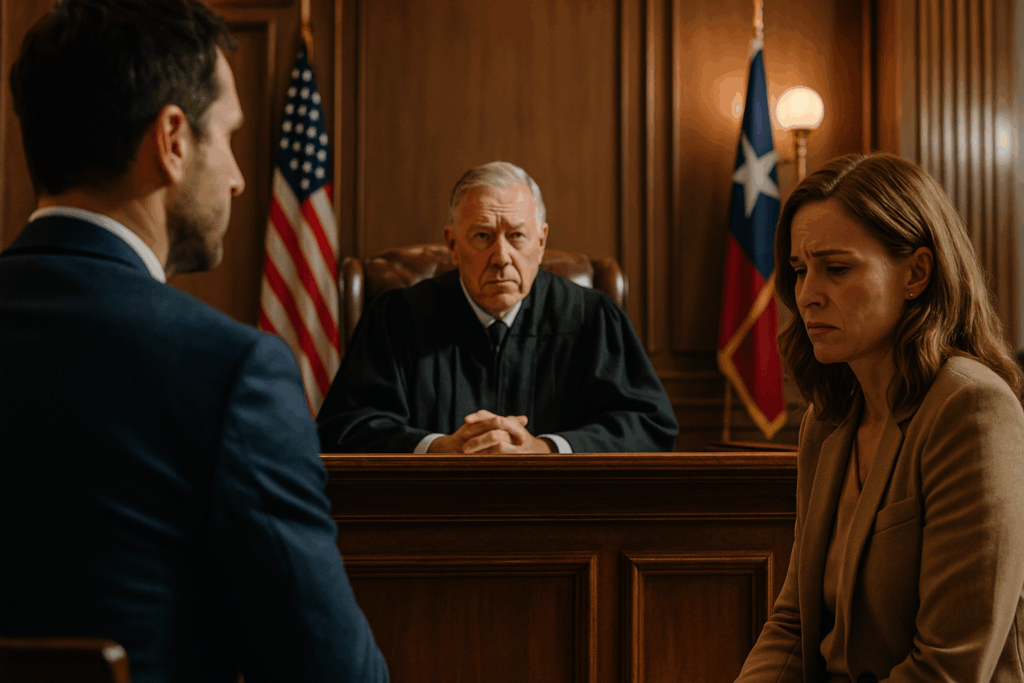
Divorce is never easy. It brings emotional stress, financial questions and legal decisions that can change your life. In Texarkana Texas, the divorce process has its own rules and challenges. This border city spans both Texas and Arkansas but only Texas family law applies when the divorce is filed on the Texas side.
Understanding how divorce works in Texas is the first step. Knowing your rights and obligations helps you make smarter choices. This is why so many people seek Expert Insights on Divorce Lawyers In Texarkana in Texas before they take legal action. The right lawyer can make the difference between confusion and clarity, delay and progress or loss and protection.
Let’s break down what you need to know about the divorce process in Texas and how the right legal help supports your journey.
Legal Grounds and Requirements
Texas law offers both no-fault and fault-based divorces. Most people choose no-fault. In this case the court grants a divorce due to “insupportability.” That means the marriage has broken down beyond repair. No one needs to prove wrongdoing. Fault-based grounds still exist. These include adultery, cruelty, abandonment and conviction of a felony.
Proving fault may give one spouse an advantage in property or spousal support decisions. To file for divorce in Texarkana you must live in Texas for at least six months. You also need to live in Bowie County for at least 90 days. If you meet those rules you can file in the county’s district court.
| Ground for Divorce in Texas | Description |
| Insupportability | No-fault ground where the marriage has become unworkable due to conflict or differences. Most common. |
| Adultery | Fault-based ground. One spouse has engaged in an extramarital affair. Requires proof. |
| Cruelty | Fault-based. One spouse is emotionally or physically abusive, making cohabitation intolerable. |
| Abandonment | One spouse has left the other for at least one year without intent to return. Must be proven. |
| Felony Conviction | A spouse has been convicted of a felony, imprisoned for at least one year, and not pardoned. |
| Living Apart | Spouses have lived apart without cohabitation for at least three years. |

Filing the Divorce Petition
The divorce process starts when one spouse files a petition. This person becomes the petitioner. The other spouse becomes the respondent. Once the petition is filed the respondent is formally served with legal documents. They have a limited time to respond. If both parties agree on all issues the divorce may be uncontested. If they disagree the case may involve court hearings, mediation or even trial.
Texas also has a mandatory 60-day waiting period before the court can finalize the divorce. Throughout this phase strong legal guidance is key. A lawyer helps file paperwork, meet deadlines and protect your rights. Many people rely on Expert Insights on Divorce Lawyers In Texarkana to better understand this process and avoid common mistakes.
Property Division in a Texas Divorce
Texas is a community property state. This means that most property earned or acquired during marriage belongs equally to both spouses. At divorce the court divides it in a way that is “just and right.” Separate property includes assets owned before the marriage or received as gifts or inheritances. These are not divided but must be clearly proven as separate. Dividing property fairly often takes time. Bank accounts, retirement funds, homes and businesses all require review. Lawyers gather financial records, hire valuation experts and work to secure what their clients deserve. A good attorney will help you know what qualifies as community or separate property. They will fight to make sure the division protects your financial future.

Child Custody and Visitation
Custody is called conservatorship in Texas. The law favors joint managing conservatorship where both parents share rights and duties. Still, one parent may be given the exclusive right to choose the child’s main residence. Visitation, or possession and access, outlines when each parent spends time with the child. Texas has standard schedules but parents can agree to something different if it works better for the child.
The court always puts the child’s best interest first. That means stability, safety and strong parenting all matter. Your lawyer’s job is to show the court how your involvement supports your child’s life. When reviewing Expert Insights on Divorce Lawyers In Texarkana in Texas, many clients stress how helpful their attorney was in creating strong parenting plans. The lawyer’s role is not just legal, they support your role as a parent, too.
Child Support Guidelines
In most cases the parent who does not have primary custody pays child support. Texas uses guidelines based on the payer’s income. Support may also include health insurance, medical costs and daycare expenses. Courts can adjust support amounts based on the child’s needs or the parents’ income. If circumstances change later, such as job loss or remarriage, parents may request a formal modification. Support is legally enforceable. Missing payments can lead to wage garnishment, license suspension or court sanctions. Your lawyer ensures the support amount is fair and accurate. They help gather income records and present your financial situation clearly.
Spousal Maintenance in Texas
Spousal maintenance, often called alimony, is not automatic in Texas. It is only granted in specific situations. A spouse may qualify if they can’t meet their basic needs or have been married for at least ten years with limited income. Other qualifying reasons include a disability, responsibility for a disabled child or family violence. Maintenance is usually limited in duration and amount. It is meant to provide temporary support while the receiving spouse becomes self-sufficient. A lawyer helps determine if maintenance is likely. They also negotiate support terms and document the need for ongoing help.
Mediation and Settlement
Many divorces settle without trial. Mediation is a structured process where both spouses meet with a neutral third party to resolve issues. It is often faster, less expensive and more cooperative than going to court. Texarkana judges often encourage mediation before a final hearing. Parents especially benefit from resolving child-related issues without a court fight. Your lawyer prepares you for mediation. They help present offers, respond to proposals and protect your interests throughout the discussion. Choosing a lawyer with mediation experience is critical. The right attorney knows when to compromise and when to hold firm.
Going to Trial
If mediation fails your divorce goes to trial. This is a formal court process with evidence, witnesses and legal arguments. The judge decides unresolved issues like property division, custody and support. Trial requires careful preparation. Deadlines, procedures and courtroom rules must be followed. Strong legal strategy is essential for success. A good trial lawyer builds a compelling case. They focus on facts, present documents clearly and question witnesses effectively. Not every lawyer is a skilled litigator. When trials happen you want someone with experience in your corner.
Post-Divorce Modifications
Life doesn’t stop after divorce. People move, incomes change and children grow up. These changes may require updates to court orders. You can ask the court to modify child support, visitation or custody. But verbal agreements between ex-spouses are not enforceable. All changes must go through the court. A lawyer helps file the right paperwork and explain why a change is necessary. They work to make sure your updated order fits your current life. This is another reason people return to attorneys they trust. In fact, many of those who benefit from expert insights on divorce lawyers in Texarkana say their lawyers continued to assist long after the divorce was final.
Enforcing Court Orders
Sometimes one party doesn’t follow the court’s orders. They may refuse to pay support, block visitation or withhold property. When that happens you can ask the court to enforce the order. Enforcement actions include wage garnishment, liens or even jail time. The process requires proof and legal action. A lawyer collects evidence and files a motion for enforcement. They help the court understand the violation and ask for remedies. Court orders are not suggestions. They are binding. And with a skilled lawyer’s help you can make sure they’re followed.
Choosing the Right Divorce Lawyer
Hiring a divorce lawyer is not just a legal decision. It’s a personal one. You need someone with skill, experience and compassion. Start by choosing someone who focuses on family law. Ask about their experience in Bowie County courts. Look at their communication style. Are they responsive, clear and confident? Discuss fees up front. Understand what services are included and how billing works. When people seek expert insights on divorce lawyers they often look for someone who listens, explains and leads. A good lawyer doesn’t just fight, they guide you every step of the way.
Final Thoughts
Divorce brings change but with the right legal help it doesn’t have to bring chaos. The process can feel overwhelming at first but proper guidance can help you make clear, confident decisions at every step. Whether you are dealing with questions about custody, property division or financial support, having a legal advocate by your side helps bring structure to an uncertain time. An experienced attorney will not only explain your options but also help you understand the potential consequences of each decision, allowing you to move forward with clarity rather than confusion.
Understanding your rights and knowing the process gives you power. You gain the ability to set boundaries, protect what matters most and stand firm when challenges arise. It allows you to protect your children, your property and your peace of mind. Legal knowledge, paired with personalized counsel empowers you to face the future with resolve. The right approach helps avoid unnecessary delays, costly errors and emotional strain. Especially in a high-stakes legal environment like family court.

Whether you are beginning a case or adjusting life afterward
Having the right attorney makes all the difference. From initial filings to post-divorce modifications, skilled representation provides long-term value and stability. The attorney you choose should be someone who listens, communicates and advocates with purpose. Their role is not just to navigate the court system but to stand as your voice during one of life’s most challenging transitions.
Smart decisions start with good information and strong representation. That’s why more people rely on expert insights. Trusted legal knowledge, combined with local experience helps you avoid common pitfalls and protect your best interests. When your future is at stake knowledge and preparation matter. Choose wisely. Move forward with confidence and with the peace of knowing that you’re not walking this road alone.
Other Related Articles:
- Breaking Down the Steps of Divorce Lawyers In Texas Free Consultation
- Is Divorce Lawyers In Fort Worth Texas Right for Your Situation?
- What You Should Know Before Pursuing Divorce Lawyers In Texas
- Important Facts About Divorce Lawyers In Texas
- What Sets Good Child Support Lawyers Apart in Texas Divorce Cases?
- The Dirty Trick of Conflicting Out Lawyers in Your Texas Divorce
- Key Considerations Before Choosing Divorce Lawyers In Cypress
- How Cost Of Divorce With Child In Texas Could Affect Your Future
- Avoid These Mistakes When Considering Best Divorce Lawyer In Texas
- Finding the Best Child Custody Lawyer in Texas: A Comprehensive Guide





